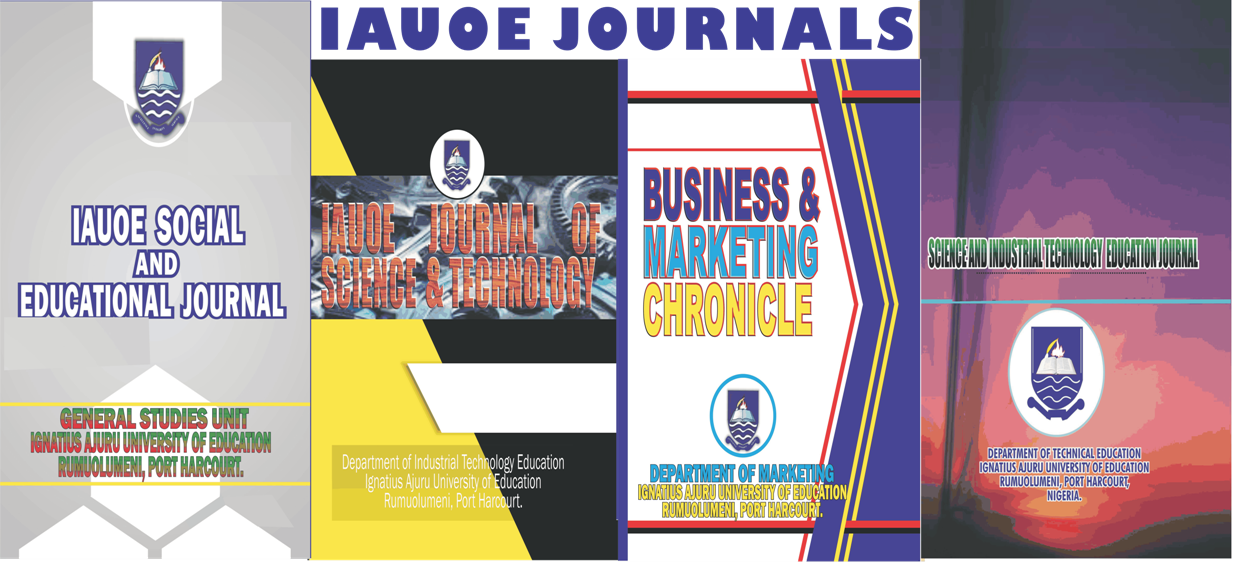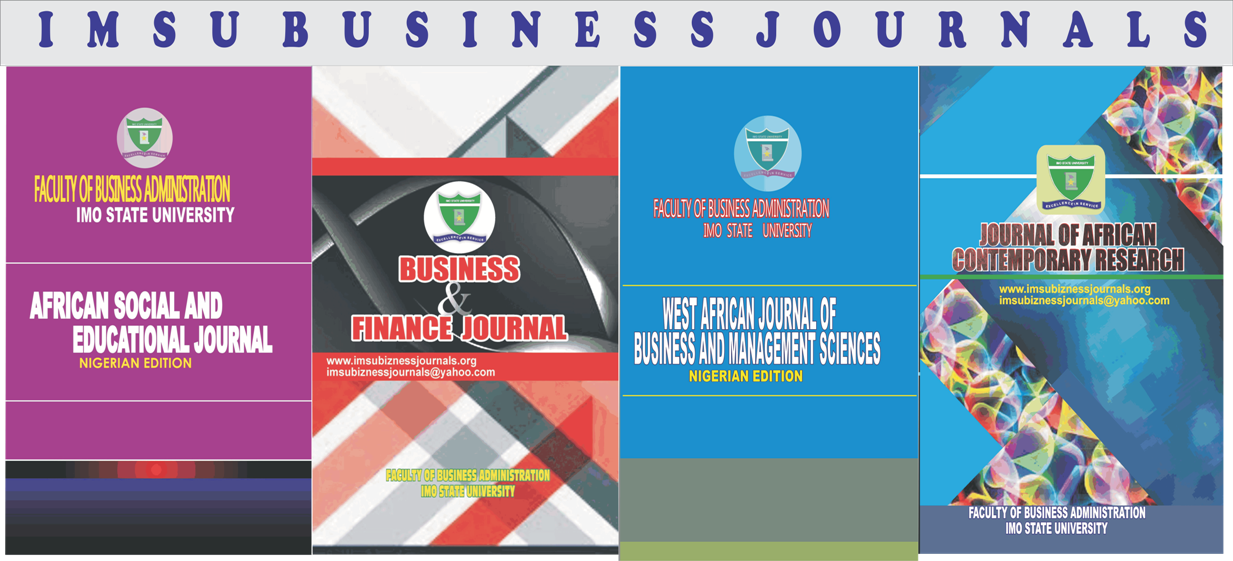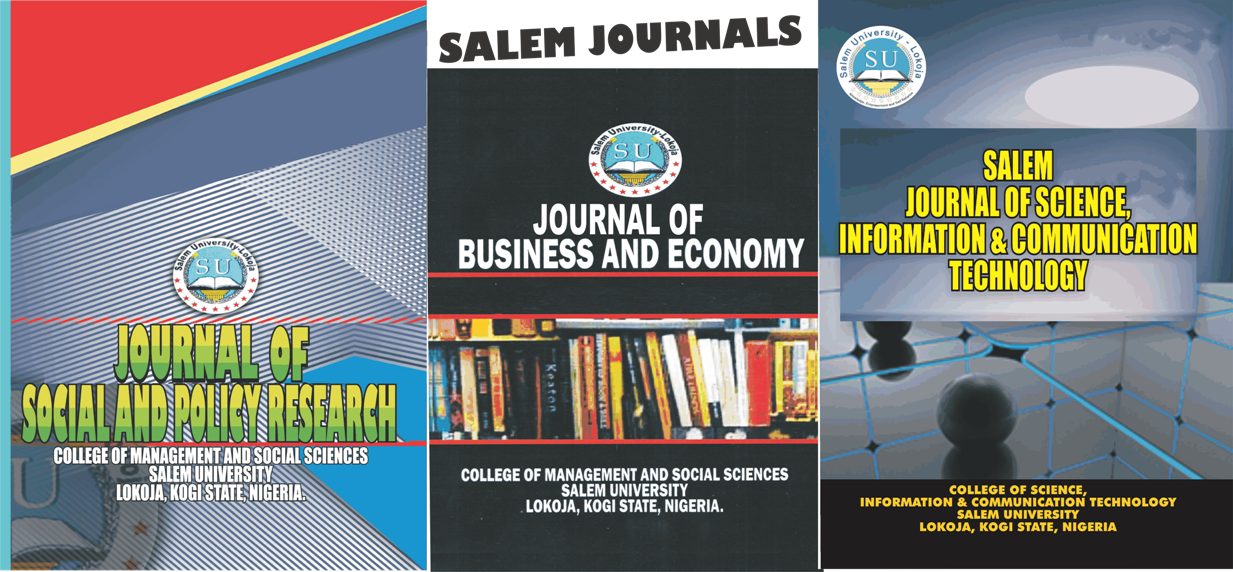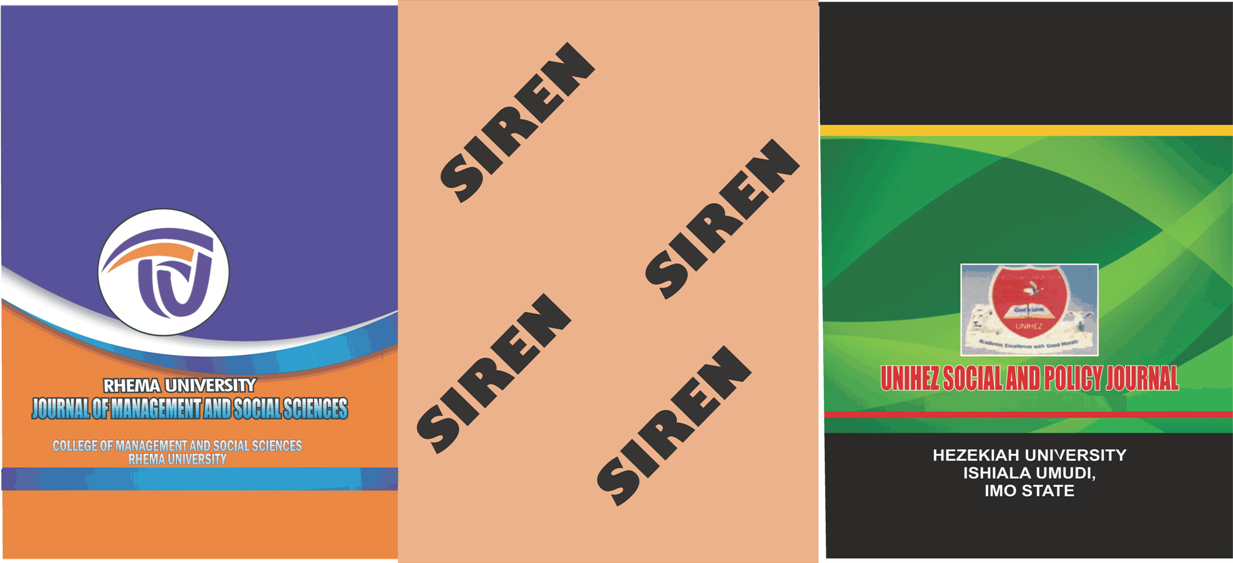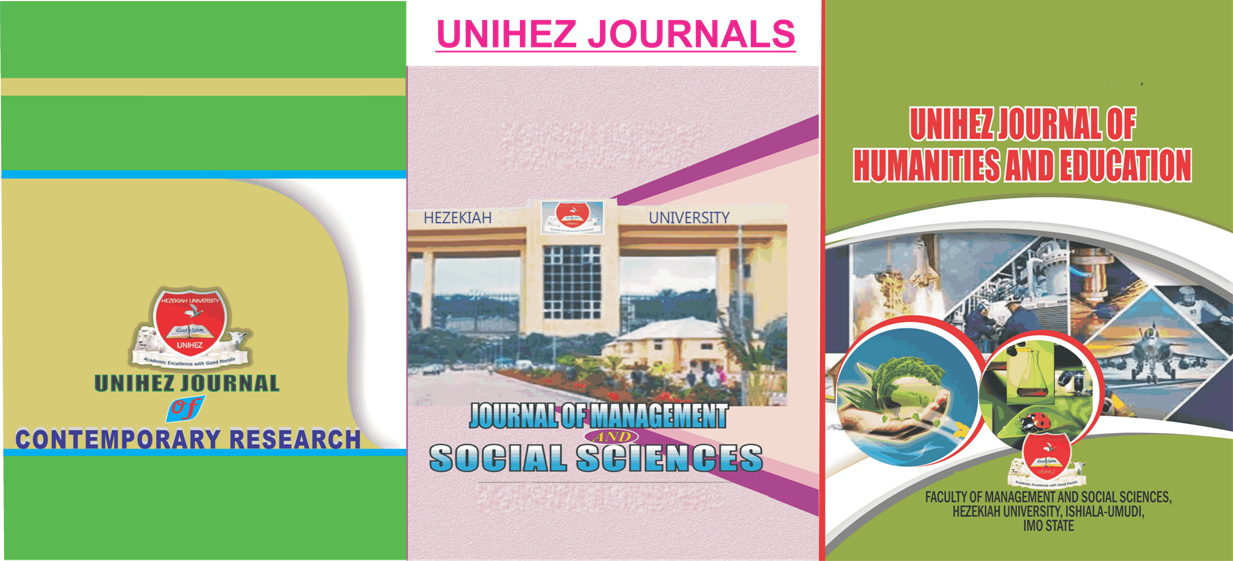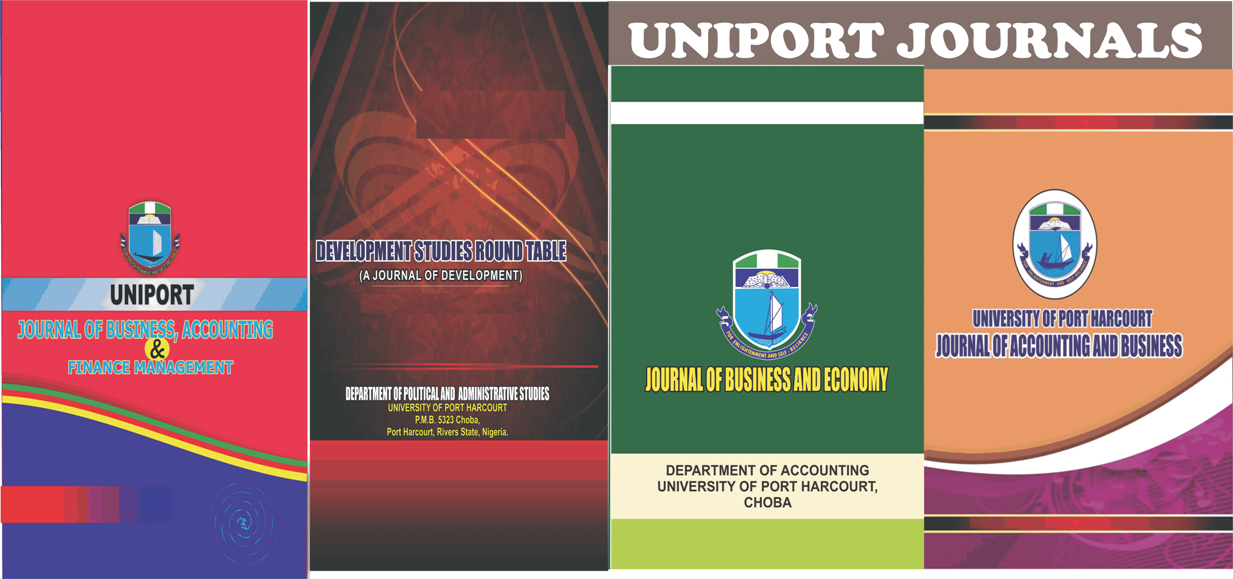2023 Archive
| 1 |
Title: DIVERSIFICATION STRATEGY AND ORGANIZATIONAL COMPETITIVENESS OF LISTED MANUFACTURING COMPANIES IN SOUTH EAST NIGERIA..pdf Author: PROF. PETER UGOCHUKWU AKANWA, PROF. ETHEL-ROSE B. UDOKWU & IKE, IJEOMA CHIDINMA, Ph.D Abstract: This study examined the relationship between diversification strategy and organizational competitiveness of listed manufacturing companies in South East, Nigeria. The study adopted descriptive survey design. Sampling technique was also utilized in the study. Data were sourced through the administration of questionnaire. The Spearman Rank Correlation (rho) was used to test the relationship between diversification and organizational competitiveness. The result of the bivariate analysis revealed that diversification strategy measures (concentric and horizontal) had a significant positive relationship with the organizational competitiveness. The findings led to the conclusion that diversification strategy is imperative in improving the competitiveness of manufacturing companies in Nigerias South-East. The study recommended, among other things, that manufacturing companies as a matter of fact should diversify to enhance their market stability and to prevent over reliance on single product business while improving their competitiveness. Key words: Diversification, Concentric, Horizontal and Organizational Competitiveness View |
| 2 |
Title: WORK-LIFE BALANCE AND ORGANIZATIONAL EFFECTIVENESS (A STUDY OF SELECTED BREWERIES IN SOUTH-EAST, NIGERIA).pdf Author: PROF. P. U. AKANWA & UGWOKE APPOLONIA CHIOMA Ph.D Abstract: This study investigated the relationship between work-life balance and organizational effectiveness with reference to selected breweries in South-east, Nigeria. Specifically, the importance of work-life balance (WLB) on employee’s productivity and process innovation in selected breweries was explored. The study employed descriptive survey and correlation research design. The population of the study comprised of 706 employees. 255 were drawn as sample size through Taro Yamane’s formula. Data generated was analyzed using descriptive statistics and Pearson product moment correlation analysis. It was discovered that, work-life balance has positive and significant relationship on employees’ productivity and process innovation of the breweries. Based on the findings, the study concluded that work-life balance practices are tools to boost employees’ productivity and process innovation activities which ultimately lead to the effectiveness of the organization. The study recommended, among others, that organizations should continue to enhance employees’ productivity and process innovation with work-life variables namely telecommuting, job sharing, flexible hours of work so as to enhance their effectiveness. Keywords: Work-life Balance (WLB), Telecom, Flexible Working Hours, Job Sharing, Employees’ Productivity, Organizational Effectiveness View |
| 3 |
Title: TEAM BUILDING AND PRODUCTIVITY OF SMALL AND MEDIUM ENTERPRISES IN SOUTH EAST NIGERIA.pdf Author: PROF. COSMAS CHIBUIKE ALUGBUO, NSISUK HARRISON AKPANABIA, Ph.D & NWOKEFORO ONYINYECHI CAROLINE, Ph.D Abstract: The study investigated team building and productivity of small and medium enterprises in South Eastern Nigeria. It was conducted to ascertain the relationship between brainstorming, Strengths, Weaknesses, Opportunities and Threats (SWOT) Analysis and productivity. The study adopted the survey research design.655 respondents were sampled for their opinion on the subject matter. Data were obtained from both primary and secondary sources. The purposive sampling technique was adopted in the study. The Cronbach Alpha statistic was used to obtain a value of 0.77 as the instrument reliability ratio. Data analysis was carried out using descriptive statistics and correlation analysis. The results indicate that brainstorming enhanced output quantity; brainstorming boosted input quantity; SWOT Analysis improved output quantity; SWOT Analysis beefed up input quantity in small and medium enterprises in South Eastern Nigeria. It was concluded that productivity improves greatly whenever brainstorming and SWOT analysis are effectively employed for problem solving in small and medium enterprises. It was recommended that employees in small and medium enterprises should always partner their management by making themselves available for brainstorming for enhanced input quantity. Organizations should consistently evaluate their strengths, weaknesses, opportunities and threats so as to be always strategically positioned for improving output quantity. Keywords: Team building, Brainstorming, SWOT Analysis, Productivity, Small and Medium Enterprises View |
| 4 |
Title: TECHNOLOGICAL ENVIRONMENT FACTORS EFFECT AND ORGANIZATIONAL RESILIENCE OF SELECTED MANUFACTURING FIRMS IN SOUTH-EAST NIGERIA.pdf Author: PROF. ETHEL-ROSE. B UDOKWU, DR. OBIALOR CHINENYE EHIKEM & DR. OBIALOR, DONATUS CHUKWUEMEKA Abstract: Abstract Technological factors offers opportunities and threats along with limitations and pressures influencing the structure and functioning of the business. The study was conducted to ascertain the effect of technological environment factors on organizational resilience of selected manufacturing firms in South-East Nigeria. A sample size of 232 was determined from a population of 552 using the Taro Yammeh’s formula. The study applied both the descriptive statistics of mean and standard deviation and simple regression analysis at 0.005 significance level for data analysis to ascertain the effect of technological factors on organizational resilience of selected manufacturing firms in South-East Nigeria. Reliability statistics was conducted to determine the level of reliability of the test instrument. Finding shows a significant positive effect of Information and Communication Technology on organizational resilience of selected manufacturing firms in South-East Nigeria. It was recommended among others that firms should provide an enabling information and communication technology environment to enhance resilience in organizations. The study concludes that an improvement in Information and Communication Technology such as production techniques, information and communication resources, production, logistics, marketing and e-commerce, would lead to increase in organizational resilience. Keywords: Technology, Information, Technique, Organization, Resilience. View |
| 5 |
Title: DEEP ACTING AND EFFECTIVENESS IN HEALTH SECTOR ORGANIZATIONS IN SOUTH-SOUTH ZONE OF NIGERIA.pdf Author: PROF. COSMAS CHIBUIKE ALUGBUO, EDWARD CHUKWUDI AGULANNA, Ph.D & LYNDA ADIOHA Abstract: This study examined the relationship between deep acting and effectiveness in health sector organizations in south-south zone of Nigeria. The study evaluated the relationship between deep acting and goal accomplishment, customer satisfaction and job satisfaction. Survey research design was used in this study because it is wide and inclusive in coverage. Simple regression analysis was employed in the study. Findings show that there is a significant relationship between deep acting and goal accomplishment; there is no significant relationship between deep acting and customers satisfaction; and there is a significant relationship between deep acting and job satisfaction of federal hospital in South-South zone of Nigeria. The study therefore recommended that employees in the service sector must demonstrate appropriate emotional labour towards their employers within the organization and customers. Keywards: Deep acting,effectiveness, goal accomplishment, customers satisfaction, job satisfaction View |
| 6 |
Title: ELECTRONIC ORDERING AND COST CONTROL IN PUBLIC ORGANIZATIONS IN SOUTH-SOUTH REGION, NIGERIA.pdf Author: PROF. ETHEL-ROSE B. UDOKWU & IGONIBO EMMANUEL THOMPSON Abstract: Electronic ordering and cost control was the concern of this study. For this purpose, the specific objectives were to evaluate the effects of domestic and international e-ordering on overhead and material cost controls. A sample size of 294 was drawn judgmentally from six public organizations in south-south Nigeria, using questionnaire. The data were analyzed using SPPS for paired correlations. The results showed that domestic e-ordering had significant direct relationship with material cost control. Similarly, international e-ordering had a positive correlation with material cost control. It was concluded that electronic ordering has a significant positive relationship with procurement cost control. It was among others recommended that; both international and domestic ordering alternatives should be considered, where applicable, with preference to domestic platforms for more effectiveness on cost control. Key words: Electronic ordering, cost control, material cost control, overhead cost control, domestic electronic ordering, and international electronic ordering. View |
| 7 |
Title: CULTURAL CLIMATE AND SALES GROWTH OF MANUFACTURING ENTERPRISES IN SOUTH EAST NIGERIA.pdf Author: UZOH KENNEDY C. Ph.D Abstract: The study investigates cultural climate and sales growth of manufacturing enterprises in South Eastern Nigeria. The study was conducted to find out the relationship between each of market culture, clan culture, hierarchy culture and sales growth in manufacturing enterprises. The study was guided by three research questions and three hypotheses. The survey resign design was used to handle the study. The researcher used the probability sampling technique in the study. Descriptive statistics of mean and standard deviation were used to analyze data. Correlation analysis was employed in the testing of the hypotheses. The analysis was enabled by Statistical Package for Social Sciences (SPSS). The findings showed that market culture significantly influenced sales growth; clan culture enhanced sales growth; and hierarchy culture improved sales growth in the manufacturing firms. It was concluded that cultural climate was a driver of sales growth in manufacturing enterprises in South Eastern Nigeria. The study recommends that manufacturing enterprises should always respect their corporate culture for the consistent improvement of their sales growth. Key Words: Cultural climate, Sales growth, Manufacturing enterprises. View |
| 8 |
Title: GENDER DIFFERNENCES AND STABLE PRODUCTIVITY IN OIL AND GAS COMPANIES IN SOUTH SOUTH, REGION NIGERIA.pdf Author: PROF PETER UGOCHUKWU AKANWA, DIGHA MENIDIN NICHOLAS & EKERUO CHUKWUDI Abstract: Evaluating the Effect of Gender Differences on Stable Productivity is a paper with the specific objectives of determining the effect of male and female genders on adaptability and innovativeness, as well as to determine the difference in innovativeness and adaptability between the male and female employees. The methodology involved the sampling of 378 respondents from four oil and gas companies in Nigeria by convenience method based on accessibility; while simple random technique was adopted in interviewing the respondents, so as to maintain equity in the sampling process. The generated samples were subjected to analysis of variance (ANOVA) and multiple correlations. The result from the ANOVA showed that there is no significant difference in adaptability or innovativeness between the male and female employees. This led to the acceptance of the null hypotheses that claimed no significant difference between the dependent and prescriptive variables. Similarly, the correlation results showed that weak (insignificant) relationships exist between gender difference and adaptability or innovativeness. It was concluded that male and female employees are equally adaptable and innovative. This led to the recommendation that management should create equal opportunities for male and female participation in the operations of the organization, among others. Keywords: Gender difference, male gender, female gender, adaptability, innovativeness, stable productivity. View |
| 9 |
Title: ELECTRONIC INVOICING AND COST CONTROL IN PUBLIC ORGANIZATIONS IN FCT ABUJA, NIGERIA.pdf Author: PROF PETER UGOCHUKWU AKANWA PROF ETHEL-ROSE B. UDOKWU & IGONIBO, EMMANUEL THOMPSON, Ph.D Abstract: Electronic invoicing and cost reduction in public organizations is a research carried out to investigate the role of e-invoicing in the cost reduction effort of four public organizations in FCT, Abuja. The specific objectives of the research were to identify the effects of e-invoicing on waste minimization, time saving, labour control and overhead control. The methodology involved a simple random sampling of 139 respondents by means of structured questionnaire. The data were analyzed using version 20 of the SPSS for correlation and regression. The results showed that a significant positive relationship exists between e-invoicing and waste minimization, e-invoicing and time saving, e-invoicing and overhead control and e-invoicing and labour control. All the Pearson coefficients were proven to be significant at the 5% level. Similarly, the standardized beta coefficients of the regression model were all significant (b1, b2, b3, b4 > 0), heading to the rejection of the research hypotheses that claimed null coefficient of multiple determination R2=0.600, depicting the model as being accountable for 60% variation in the dependent variables. This led to the conclusion that e-invoicing as a hybrid technology in public procurement and supply chain management has significant positive effects on cost control. Based on this it was recommended that e-invoicing should be adopted by procurement agencies as a strategy to minimize material and time wasting; among other recommendations. Keywords: E-invoicing, waste minimization, time saving, labour control, overhead control, cost control. View |
| 10 |
Title: GENDER INCLUSIVENESS IN DECISION MAKING AND NATIONAL ECONOMIC DEVELOPMENT IN WEST AFRICAN SUB-REGION..pdf Author: EKWOABA, JOY ONYINYECHI (Ph.D.) & EKWOABA, DAVID IKECHUKWU (Ph.D.) Abstract: Gender equality embraces fundamental human rights and enhances the meaningful peace for a sustainable world. The Sustainable Development Goal 5 target 5, ensures women inclusiveness at all levels of decision making in political, economic and public life. The study, therefore, examined the influence of women participation at the National Assembly and the effects on the national economic productivity. Secondary data from the World Bank was used for analysis. Data used included the percentage of women in the national assembly as at 2021 in the 15 West African states (with complete data) and the Gross Domestic Product (GDP) per capita. One way ANOVA was used to analyze the data. The result shows that higher representation of women at the national assembly yields higher GDP per capita. However, this relationship is not statistically significant even when women representation was at 30 percent and above, the level that was the affirmative action taken at Beijing Declaration and platform for Action in 1995. There is need therefore, to properly assess the level of women representation in decision making that could yield significant impact in the economic recovery, especially in the West African Sub-region. Keywords: Gender, Decision making, Economic development, Inclusiveness, Sub-region View |
| 11 |
Title: PRODUCT INNOVATION AND SUSTAINABILITY OF MANUFACTURING FIRMS IN SOUTH EAST ZONE OF NIGERIA.pdf Author: PROF. COSMAS CHIBUIKE ALUGBUO, NSISUK HARRISON AKPANABIA, Ph.D & ONWUNEME UGONNA PRISCA Abstract: The researchers have done justice by examining the relationship between product innovation and sustainability of manufacturing firms in south east zone of Nigeria. Product innovation was seen as the independent variable as sustainability is the dependent variable with its parameters as efficiency, market competitiveness and customer retention. The study adopted the use of survey research. Data for the study was collected from the primary source as the questionnaire was the major instrument used to generate the data. The study employed the use of regression analysis and the findings showed that there is significant relationship between product innovation and efficiency of manufacturing firms, there is significant relationship between product innovation and market competitiveness of manufacturing firms, also that there is a significant relationship between product innovation and customer retention of manufacturing firms. Based on the findings the study recommends among others that Firms that are endowed with resources to improve their innovative capabilities could expect a more significant improvement of their production and market performance, if they encourage and implement a high level of innovation activities. Keywords: Product innovation, sustainability, efficiency, market competitiveness, customer retention View |
| 12 |
Title: INFORMATION AND COMMUNICATION TECHNOLOGY (ICT) AS A DRIVER OF ADMINISTRATION AND ACADEMICS IN TERTIARY EDUCATION SYSTEM....pdf Author: PROF. ETHEL-ROSE B. UDOKWU, NJOKU, KENNETH CHUKWUDI, PhD & OPARAKU, UDOKA, PhD Abstract: In the modern era, Information and Communication Technology (ICT) has remained the driver of quality processes, systems and growth indicators in virtually all kinds of organizations. The level of appreciation and commitment to the use of this essential cum critical instrument differs from organization to organization. The paper investigates ICT and tertiary education system in Nigeria. It evaluates the prospects and challenges of improving academics and administration in tertiary education system using ICT. The objectives of the study include to examine the applications of internet and e-learning for improved academics and administration in tertiary education system in Nigeria; to evaluate the challenges of ICT usage in academics and administration in the tertiary education system; and to assess the prospects of ICT usage in academics and administration in tertiary education system in Nigeria. Three research questions were also raised based on the objectives of the study. The study employed the Fred D. Davis’ Technology Acceptance Model for the theoretical framework. The research questions were answered with extant literature approach which formed the methodology of the study. It was found that there were various applications of internet/e-learning that were used for improved academics and administration in tertiary education system in Nigeria - the applications include computer-based teaching, virtual classroom, video-conferencing and digital collaborations, e-library and online exams among others; there were challenges of ICT usage in academics and administration in tertiary education system including erratic power supply, computer illiteracy and funding inadequacies among others. Also, the prospect of ICT usage in academics and administration in tertiary education system in Nigeria is bright and high. The research concludes that ICT is a viable, reliable, formidable and potent tool for improving academics and administration in tertiary education system. The study recommends that management of the Nigerian tertiary institutions should always develop policies that may add value to the use of ICT for improved academic and administrative practices in the institutions. Keywords: ICT, Administration, Tertiary education system, Academics Challenges, Prospects. View |
| 13 |
Title: WHISTLE BLOWING AND COST EFFICIENCY IN A MANUFACTURING COMPANY IN SOUTH EASTERN NIGERIA.pdf Author: PROF. COSMAS CHIBUIKE ALUGBUO, EDWARD CHUKWUDI AGULANNA, Ph.D & LYNDA ADIOHA Abstract: Whistle-blowing activities around the world have generated huge interests from concerned parties such as the financial and public service, as the aftermath of its neglect often has dilapidating effects on the sustainability of economic growth and development of the nation. This is often seen in the 3rd world nations, such as Nigeria. This study aimed to examine the effect of whistle-blowing, on cost efficiency in a manufacturing company in South Eastern Nigeria: a case of Nigeria bottling company Owerri. This study adopted the descriptive survey research design. The population of the study is 143 while the sample size is 100.This study adopted the Theory of Planned Behavior.The study discovered that whistle-blowing has significant positive effect on cost efficiency.It was recommended that whistle blowing policy should be properly encouraged and implemented in private organizations to achieve minimum involvement of corruption and that whistleblowers should be protected to encourage disclosure of corrupt acts in organization. This in turn will bring cost efficiency in the organization. Keyword: Whistleblowing, cost efficiency, cost reduction, fraud reduction, management decision making View |
